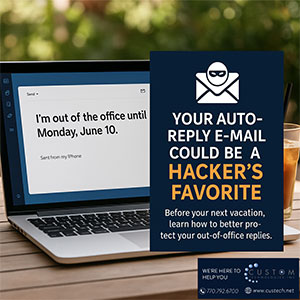 You’re packing for vacation. You set your out-of-office reply and forget about it.
You’re packing for vacation. You set your out-of-office reply and forget about it.
“Hi there! I’m out of the office until [date]. For urgent matters, please contact [coworker’s name and e-mail].”
Sounds helpful, right?
Unfortunately, it’s also exactly what hackers are hoping to see.
If your team in Metro Atlanta uses detailed auto-replies, you might be handing cybercriminals the perfect playbook for their next attack.
🎯 Why Auto-Replies Are a Gold Mine for Hackers
That friendly OOO (out-of-office) message usually includes:
- Your name and job title
- The dates you’re unavailable
- An alternate contact’s name and e-mail
- Clues about internal team structure
- Sometimes even where you’re going or why
What hackers see:
✅ Timing – You're unavailable and unlikely to catch suspicious activity
✅ Targeting – They now know exactly who to impersonate (and who to trick)
This information forms the perfect setup for a phishing scam or business e-mail compromise (BEC) attack.
🧠 How the Scam Works
- Your auto-reply goes out.
- A hacker spoofs your e-mail or the colleague you listed.
- They send a convincing message requesting a wire transfer, login credentials, or a sensitive file.
- Your coworker, assuming it’s legit, acts fast.
- You return to the office and learn $45,000 went to “a vendor” that doesn’t exist.
This isn’t theory—it happens all the time, especially in companies that rely heavily on e-mail-based workflows and travel frequently.
✈️ Traveling for Business? Your Risk Is Even Higher
If your Metro Atlanta company has sales teams, executives, or admin staff managing communications during travel:
- Assistants often field multiple e-mails daily
- They’re used to urgent requests
- They trust the names in their inbox
All it takes is one fake—but well-timed—message to trigger a major breach or financial loss.
🔐 How to Protect Your Business From OOO-Based Attacks
You don’t need to stop using auto-replies—but you do need to be smart about them.
- Keep It Vague
Avoid specifics about your travel plans or internal contacts.
Better:
“I’m currently out of the office and will reply upon my return. For urgent matters, please call our main office at [phone number].”
- Train Your Team
Make sure employees understand:
- Never send sensitive info based on email alone
- Always verify unusual requests through a second method (call, text, in-person)
- Strengthen E-mail Security
Use domain authentication (SPF, DKIM, DMARC), spoofing protection, and robust phishing filters. - Enforce MFA on All Accounts
Multifactor authentication ensures that even if passwords are stolen, hackers can’t get in. - Partner with a Proactive IT Team
At Custom Technologies, Inc., we monitor login attempts, alert you to suspicious activity, and proactively block threats before they do damage.
🌴 Ready to Enjoy a Stress-Free Vacation?
Don’t let a simple auto-reply open the door to cybercriminals.
Let us help you secure your communications and protect your team—even while you’re offline.
👉 Click here to book your FREE Security Assessment today!
We’ll uncover vulnerabilities, strengthen your defenses, and make sure your inbox doesn’t become a liability.



